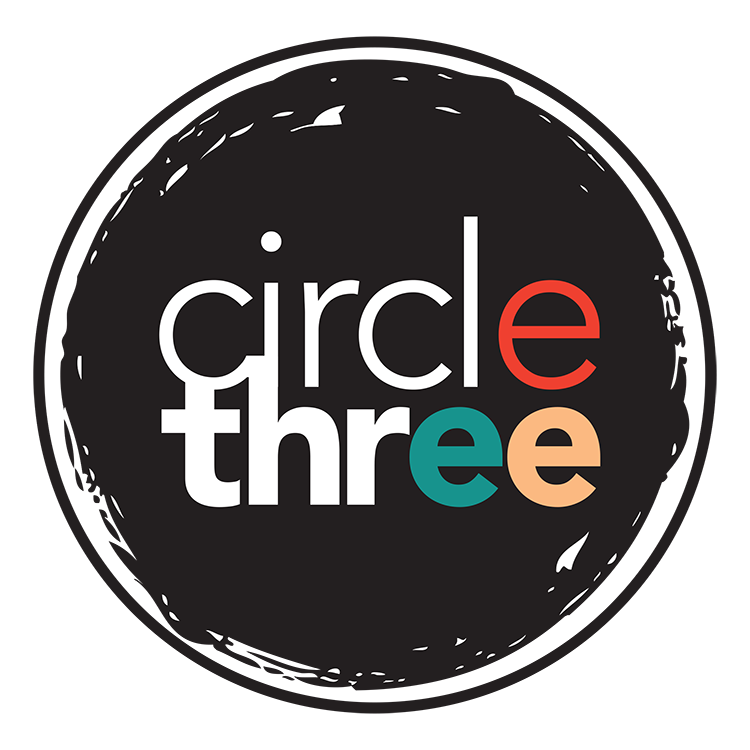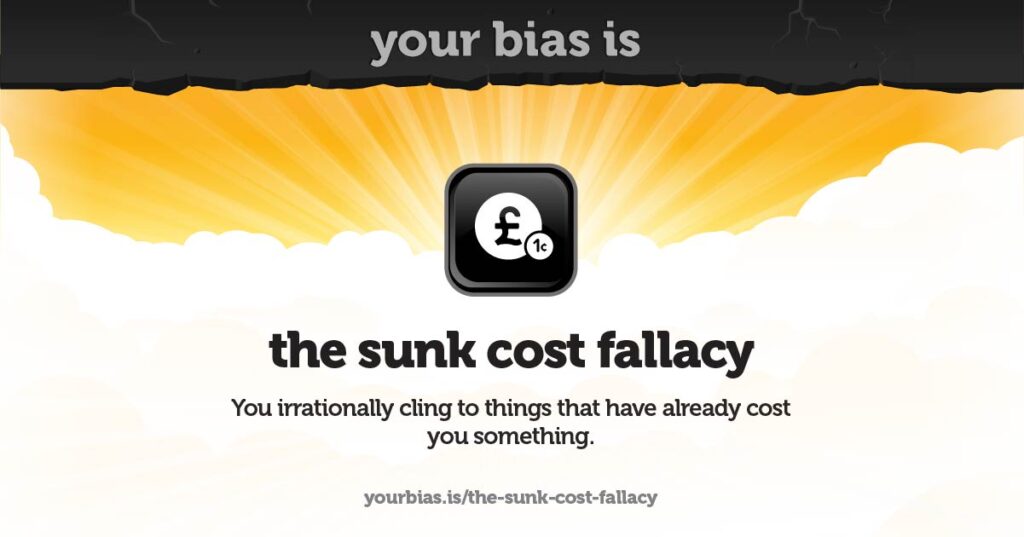This is Part Three in a series on Cognitive Biases and Logical Fallacies in marketing. Read more here.
The sunk cost fallacy is a cognitive bias that leads people to make irrational decisions based on the amount of time, money, or resources they have already invested in a particular endeavor, even when continuing that endeavor is no longer rational or beneficial. In other words, individuals tend to factor in the “sunk costs” (costs that have already been incurred and cannot be recovered) when making decisions about future actions, despite those costs being irrelevant to the decision at hand.
This fallacy can be observed in various aspects of life, such as personal relationships, business ventures, investments, and even simple everyday decisions. People may continue to invest time, effort, or resources into a project, relationship, or activity that is clearly failing or not providing the expected returns simply because they’ve already invested so much into it. They fear “wasting” what they’ve already put in, leading them to ignore the current circumstances and make suboptimal choices.
Sunk Cost Fallacy in Businesses
The sunk cost fallacy can have a significant impact on business decisions and marketing strategies. Here’s how it often manifests in these areas:
Business Decisions
- Project Continuation: Businesses might continue investing resources, time, and effort into a project that has shown poor performance simply because they’ve already spent a lot on it. This can lead to allocating more resources to a failing project, diverting resources from potentially more promising endeavors. “We can’t quit now!”
- Technology Investments: If a company has invested heavily in a specific technology or software solution, they might be reluctant to switch to a more efficient or cost-effective alternative, even if the current technology is not delivering the expected results. This can hinder innovation and hinder the company’s ability to adapt to changing market conditions. “We just upgraded!”
- Merger and Acquisition (M&A) Decisions: Companies engaged in M&A activities might continue with a deal that isn’t proving to be as advantageous as initially thought, due to the substantial time and resources already invested in the negotiation process – or the potential for embarrassment. “If we don’t follow this through to the end…”
Marketing Strategies
- Advertising Campaigns: In marketing, businesses might persist with advertising campaigns that aren’t generating the desired results, simply because they’ve already invested a significant budget into them. This can lead to wasted resources and missed opportunities to pivot towards more effective strategies. “If we just spend a little more…”
- Product Launches: If a company invests heavily in the development and marketing of a new product, they might be hesitant to admit failure and withdraw the product from the market, even if it’s not meeting customer needs. This can lead to a negative impact on the company’s reputation and profitability. “We have to carry on. We already committed.”
- Social Media and Content Marketing: Businesses might continue to invest time and resources into social media platforms or content marketing efforts that aren’t delivering engagement or conversions. The belief that “we’ve put so much effort into this, it must work eventually” can lead to a waste of resources and missed opportunities to explore more effective strategies. “Someday this will pay off!”
In both business decisions and marketing, it’s crucial to assess the current situation objectively and make decisions based on the potential future outcomes rather than being influenced solely by the resources already invested. This requires a willingness to cut losses when necessary and allocate resources strategically to initiatives that offer the greatest potential for success.
Let’s Fix It
Mitigating the sunk cost fallacy in marketing waste, recycling, and sustainability services requires a combination of strategic planning, data-driven decision-making, and a commitment to focusing on the long-term benefits rather than past investments. SPOILER ALERT: The quick answer is to not let the past hold you back. Focus on the data.
Here are some steps that companies can take to avoid making decisions based on sunk costs:
- Data Analysis and Evaluation
- Regularly assess the effectiveness of marketing campaigns and initiatives. Use key performance indicators (KPIs) such as customer engagement, conversion rates, and ROI to objectively measure success.
- Analyze customer feedback and behavior to understand their needs and preferences. This information can guide adjustments to marketing strategies.
- Flexibility and Adaptability
- Be open to adjusting or discontinuing marketing efforts that are not delivering the expected results. Avoid clinging to campaigns solely because resources have been invested in them.
- Allow for experimentation and innovation. Test different messaging, channels, and approaches to find what resonates with your target audience.
- Long-Term Sustainability Goals
- Emphasize the long-term goals and benefits of waste reduction, recycling, and sustainability services in your marketing messages. Highlight the positive environmental and social impact, which can resonate with consumers and businesses alike.
- Frame your marketing around the value proposition of these services rather than the resources invested. For instance, focus on cost savings, eco-friendly practices, and community engagement.
- Educational Content
- Develop informative content that educates your audience about the importance of waste reduction and recycling. Educated consumers are more likely to understand the value of your services and make informed decisions.
- Customer-Centric Approach
- Prioritize the needs and preferences of your customers. Tailor your services and marketing messages to address their pain points and desires.
- Solicit customer feedback and use it to refine your services and marketing strategies.
- Risk Analysis
- Consider the potential risks and benefits of continuing or discontinuing specific marketing efforts. Compare the potential gains of redirecting resources to more effective strategies against the potential losses of continuing ineffective ones.
- Clear Decision-Making Processes
- Establish clear decision-making processes for evaluating and adjusting marketing strategies. This can help prevent emotional attachments to failing initiatives and ensure that decisions are based on data and analysis.
- Internal Communication
- Foster a company culture that values adaptability and data-driven decision-making. Encourage open discussions about the effectiveness of marketing efforts and create an environment where adjusting strategies is seen as a positive step.
By implementing these strategies, companies can work to overcome the sunk cost fallacy in their marketing of waste, recycling, and sustainability services. The key is to focus on the future benefits and the alignment of these services with customer needs and broader environmental goals, rather than being swayed by past investments.
Interested in Learning More?
We’ll cover more cognitive biases and logical fallacies in upcoming blog posts, but if you’re eager to learn more and access free resources, check out School of Thought. If you’re interested in see how Circle Three Branding applies these to your marketing strategy, contact us.

